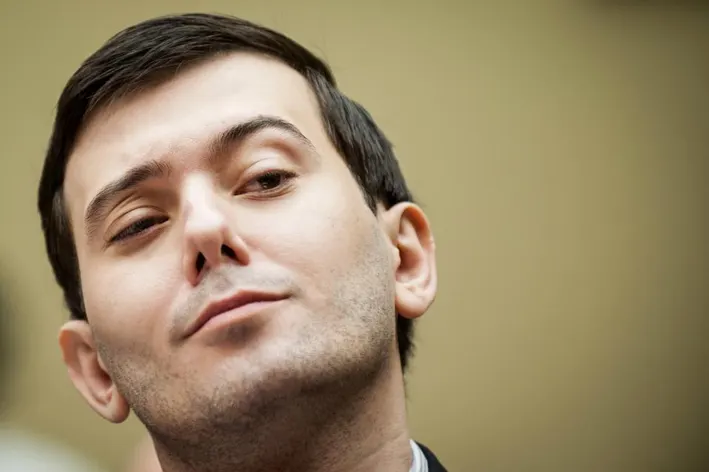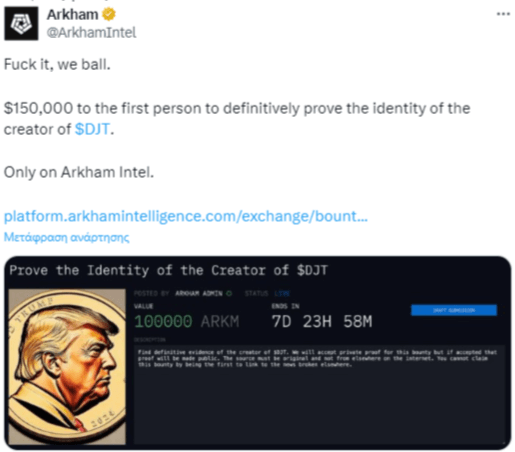- Claims of Barron Trump’s involvement in DJT were false.
- Shkreli possibly violated parole terms through his actions.
- Significant financial impact observed, including a drop in TRUMP crypto value.
- Broader concerns raised about the integrity of the crypto market.
- Shkreli probably did this to discredit president Donald Trump.
In a revelation that has roiled the crypto market, the Solana-based memecoin DJT has been exposed as a scam.
The coin, initially promoted as being backed by Barron Trump, was revealed to be a fraudulent project orchestrated by the notorious Martin Shkreli. The exposure came through the efforts of crypto investigator ZachXBT, leading to Shkreli’s public confession.

Martin Shkreli, already known for his controversial history in the pharmaceutical industry, had managed to create a buzz around DJT by falsely linking it to Donald Trump’s youngest son.
This narrative spurred significant investor interest and speculation. The unraveling began when Arkham Intel offered a $150,000 bounty for the real identity of DJT’s creator, prompting swift action from crypto sleuths.

Financial Misdeeds and Market Impact
ZachXBT was instrumental in unmasking Shkreli. After his submission to Arkham’s bounty, Shkreli, in a panic, admitted to being the brains behind DJT.
Here’s ZachXBT’s thread on X where he reveals about the connection between DJT memecoin and Martin Shkrelli (opens in a new window).
Concurrently, suspicious financial transactions linked to the memecoin indicated malfeasance.
An insider, previously associated with Shkreli, offloaded $832,000 worth of DJT, converting it to USDC and transferring it to a centralized exchange. This pattern echoed Shkreli’s past deceptive financial practices.
The fallout was immediate.
Steven Steele, Marketing Director for the legitimate TRUMP memecoin, noted significant confusion and damage to Trump’s business interests.
The legitimate TRUMP crypto experienced a drop of over 50% in value, though it later recovered by about 20%.
Legal Ramifications and Market Sentiment
Shkreli’s actions have potentially severe legal implications. Adam Cochran, managing partner at CEHV, highlighted the possibility of parole violations.
Shkreli’s financial dealings, including the use of an offshore
The DJT scam has also sparked broader discussions within the crypto community. Prominent trader Josh Rager criticized the focus on meme-driven projects, arguing that they undermine the potential of blockchain technology.
He emphasized the need for the market to refocus on promising technologies and worthwhile projects.
Rager stated, “The crypto market and industry need to re-focus on promising tech again, to teams/projects building something worthwhile. There’s been a shift of narrative on memes, and it’s been a net-negative with an over saturation of crap tokens and rugs flooding the market. Today was a real eye-opener for a lot of people.”
Conclusion
The exposure of the DJT memecoin scam has had significant repercussions, both financially and legally.
Martin Shkreli’s involvement and subsequent confession underline the need for diligence and transparency in the cryptocurrency space.
As the market reacts to this revelation, the broader community is called to reconsider the focus on speculative projects and realign towards sustainable and innovative blockchain technologies.
LATEST POSTS
- VanEck Launches First Bitcoin ETF on Australian Securities Exchange
- NFT Artist Sues Elon Musk’s X Corp Over Account Suspensions
- Daddy Tate Memecoin Skyrockets Amid Insider Trading Concerns
- Can Google Authenticator Get Hacked?
- FatBoy – The Play-to-Earn MEME Invasion is Coming!
Previous Articles:
- VanEck Launches First Bitcoin ETF on Australian Securities Exchange
- NFT Artist Sues Elon Musk’s X Corp Over Account Suspensions
- Daddy Tate Memecoin Skyrockets Amid Insider Trading Concerns
- Can Google Authenticator Get Hacked?
- FatBoy – The Play-to-Earn MEME Invasion is Coming!
